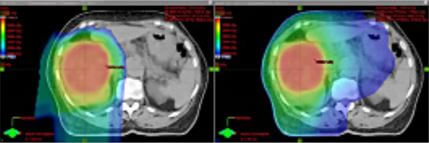Proton Therapy for Sarcoma
Treat sarcomas while minimizing the risk for side effects
Sarcomas can occur in many places throughout the body. Some tumor locations are not suitable for surgery, and others may need high doses of radiation to be effective. This can pose a danger if the sarcoma is located near your head and neck, pelvis, or spine.
Proton therapy can be a great option for sarcomas in hard-to-treat areas of the body. It can direct a high dose of radiation at the tumor while avoiding the healthy organs and tissues nearby. With proton therapy, your radiation oncologist can increase the radiation dose (a process called “dose escalation”) so that your tumor gets the most effective treatment possible.
Minimizing the dose healthy tissues receive also helps to reduce the risk of short- and long-term side effects of radiation treatment. This can be especially helpful for children and people whose cancer has grown back (recurrence).
Comparison image – Proton Therapy is on the left, Photon Therapy is on the right
Sarcomas we treat with proton therapy
At MPTC, our expert team of radiation oncologists treats a variety of sarcomas in adults and children, including:
- Angiosarcoma
- Chondrosarcoma
- Epithelioid sarcoma
- Ewing’s sarcoma
- Fibrosarcoma
- Gastrointestinal stromal tumor
- Leiomyosarcoma
- Liposarcoma
- Malignant peripheral nerve sheath tumor
- Osteosarcoma
- Pleomorphic sarcoma
- Rhabdomyosarcoma
- Synovial sarocoma
- Other sarcomas
Proton therapy for recurrent sarcomas
If you’ve previously had a sarcoma and it was treated with radiation therapy, traditional x-ray radiation may not be recommended because the area around your tumor can only tolerate a limited amount of radiation over a lifetime. However, proton therapy can be safe to use for treating recurrent sarcomas, as it can provide an optimal dose of radiation that limits the dose that the healthy tissue surrounding the sarcoma receives. This makes radiation a viable option for recurrent sarcomas.
Learn more about proton therapy
Request a consultation below to learn if proton therapy might benefit you. Our physicians will work with you and your care team to create your personalized treatment plan.


